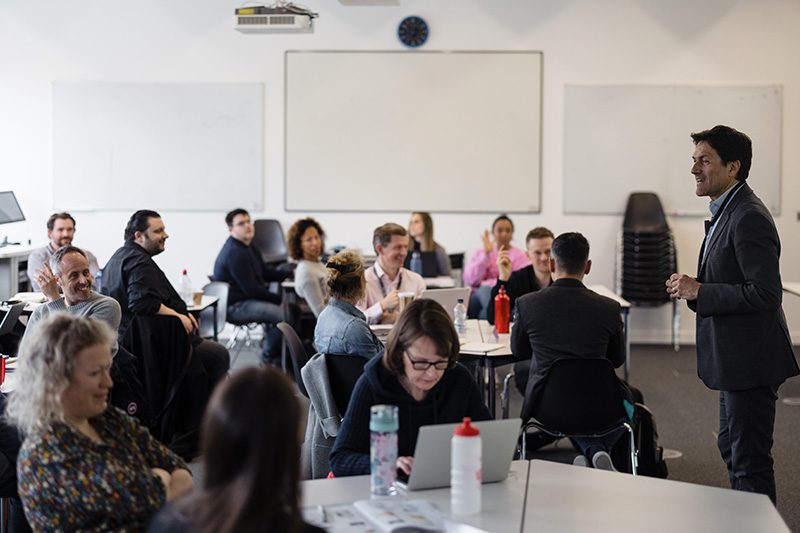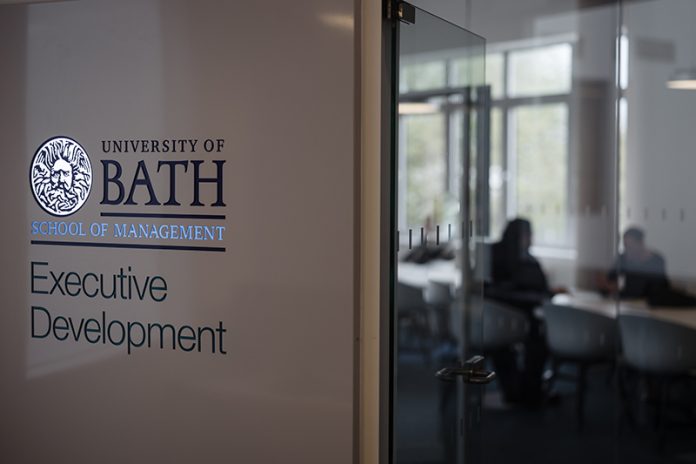Director of MBA programmes at the University of Bath, Dr Donald Lancaster, explores the role of post-experience education in developing people strategies for sustainable growth.

Most organisations prefer to promote from within; elevating people who know the organisation, understand its culture, customers, competition, and products or services. It’s both cheaper and safer to operate this way, as has been the case for centuries. However, there is a risk of the ‘Peter Principle’ applying, whereby people who demonstrate functional expertise within a vertical workstream find themselves promoted to managerial or leadership roles without the training or competencies to oversee disciplines other than their own.
This theme is one that permeates many discussions with our students and corporate partners when considering their futures. Organisations find it a challenge to successfully harness the talent within their teams and develop future leaders who are equipped with the breadth of skills and knowledge needed. They have the desire and motivation to make positive impacts, but not always the tools in their armoury to reap success.
An MBA is designed to provide broad-based appreciation of and across multiple disciplines. A good MBA programme enables managers and future leaders to see beyond their functional expertise, to see the interconnectedness of business disciplines, and to know the appropriate questions to ask of other experts/departments as well as being able to interpret answers in disciplines that are not their own.
Karl Fearnley, EMBA alumnus and Systems and Equipment Director at Babcock International Group, reflects on how the Bath MBA has helped him:
“One of the biggest learnings I’ve had through my MBA is to continue to understand myself and how I impact other people and my team. The MBA programme enabled me to lift myself up as an individual and look at business with more strategic context and thinking. It gave me the opportunity to see things from a C-Suite level and apply units and modules to board level. That was the step change in my career that I wanted and needed.”
Developing talented staff brings benefits to employers as well. People Director at Vendigital, Anita Maguire, sees the MBA programme as intrinsic to their business’ growth strategy.
“As an organisation, we’re expecting to grow by 30-40% this year alone and we see the MBA programme as a key enabler of developing our team and the leadership team of tomorrow.”
“The impacts have been far-reaching, providing us with a competitive advantage and level of credibility that allows us to compete with the big consultancies. We are always looking at ways to capitalise on that further and bring more employees onto the programme.“
For many people across the world, a first degree is essentially ‘table stakes’ for getting into the job market, whilst not necessarily conferring career advantage. The MBA, taken as a post-experience learning opportunity, is proven to benefit both individuals and their employers through increasing effectiveness, understanding, application and productivity. For individuals, significant salary increases and promotions following MBA graduation are commonplace, often as a reward for consequential increases in performance by the employing organisation. The balance provided within Bath’s MBA of theory and practice, of knowledge, understanding and application, is critical to the future success of graduates:
“Nationwide has supported several employees through the Bath Executive MBA course, and that’s really helped us shore up our capabilities as a management team,” explains Toby Clark, Advice Distribution & Servicing Development Lead, Nationwide.

“The breadth of experience you get from the MBA and the understanding and capabilities you grow from it, enable us to be able to think differently as a management team. I’m constantly seeking management talent coming up through the ranks who have the appetite to learn and the desire to push themselves forward and also have the capability of taking the breadth of learning from the MBA and applying it back into the workplace.“
In times past, most MBA programmes had a singular drive towards the generation of profit and shareholder value. Today, and not before time, this is mitigated through a much greater holistic focus on other areas which matter, notably sustainable leadership and responsible management.
At Bath we embed these principles through every course on our MBA programmes, in the certainty that every aspect of business, and every leader or manager, has a responsibility towards ESG goals and respect for our planet. Paying lip service to sustainability through a single course on a programme is totally insufficient in world where all the evidence is pointing to the need for dramatic change across the entire work-scape.
Our partnership with commercial organisations, other institutions and third sector bodies is largely contingent on mutual respect for ESG goals. The topics of project-work our students undertake are increasingly focused on aspects of sustainability within their own organisations – or other firms who want help in these areas. Students are also driven to contribute to sustainability, hopefully providing a virtuous circle which in the long run will benefit people, business countries and the wider environment.
“Investing in an MBA for your employees is expanding the capabilities as an organisation,” adds Toby.
“The constant evolution of a business can only be fuelled by new thinking, new thoughts. But there must be structure around that. What the MBA gives is the structure, the theory and the academic study. That means the change can be really captured, governed and pushed forward in real-time. It’s absolutely valuable.”
The article was first published on July 28, 2022




































